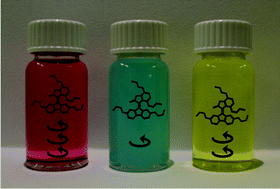Solvent effects on the thermal isomerization of a rotary molecular motor†
Abstract
As molecular machines move to exciting applications in various environments, the study of medium effects becomes increasingly relevant. It is difficult to predict how, for example, the large apolar structure of a light-driven rotary molecular motor is affected by a biological setting or surface proximity, while for future nanotechnology precise fine tuning and full understanding of the isomerization process are of the utmost importance. Previous investigations into solvent effects have mainly focused on the relatively large solvent–solute interaction of hydrogen bonding or polarization induced by the isomerization process. We present a detailed study of a key step in the rotary process i.e. the thermal helix inversion of a completely apolar rotary molecular motor in 50 different solvents and solvent mixtures. Due to the relative inertness of this probe, we are able to study the influence of subtle solvent–solvent interactions upon the rate of rotation. Statistical analysis reveals which solvent parameters govern the isomerization process.


 Please wait while we load your content...
Please wait while we load your content...